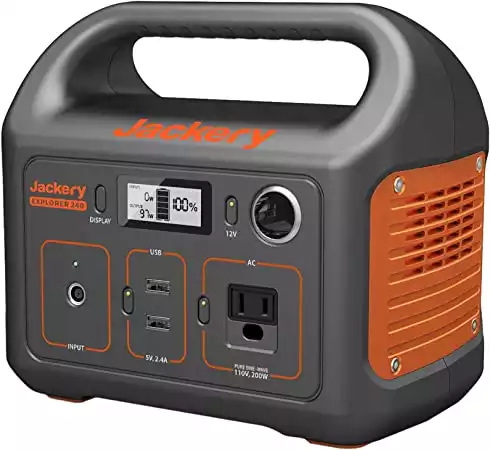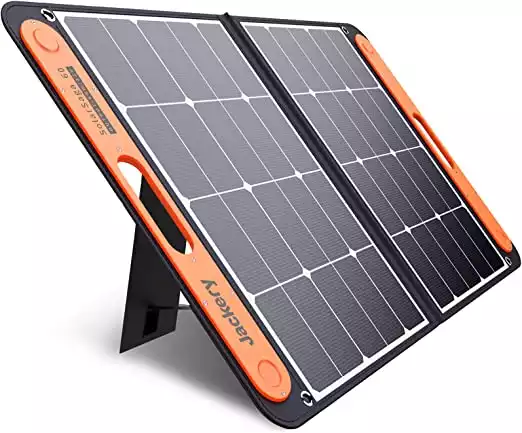Getting off the grid has been growing in popularity, and it’s also trendy in camping.
While you might enjoy some creature comforts when you take to the outdoors with your tent, dry camping takes the idea of camping back tochec a simpler time.
What, exactly, is dry camping?
Dry camping is when you camp without electrical or water hookups at your campsite. You will probably be in an RV without these facilities, but you could also be in a tent in a primitive campground.
There’s no better way to tune out of technology and the stress of the nine-to-five world than by dry camping!
You’re usually allowed to camp in public and private places, but you might have to pay a fee. Here’s everything you should know about it before you try it.
Is Dry Camping The Same Thing As Boondocking?
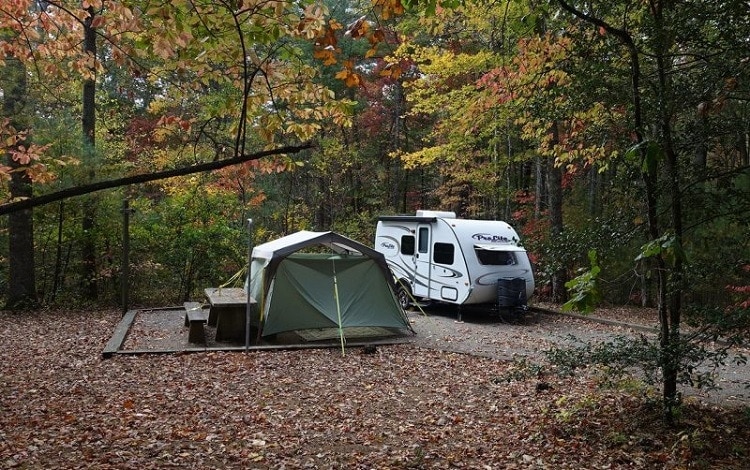
While some people use the terms “dry camping” and “boondocking” interchangeably, they’re actually a little different.
Here are some important things to know about them and how they vary.
- Boondocking is when you go camping without any water or electrical hookups that are present in many developed campgrounds.
- Dry camping is camping without those hookups, but the main difference is that it can occur even at an established campground.
While the terms are a little different, bear in mind that some websites and people will use them interchangeably and that is seen as acceptable.
However, when it comes to national forests and state parks, sometimes they’ll make use of the term “dispersed camping.” It helps to know that to prevent confusion!
Top Dry Camping Tips
If you’re intrigued by the idea of dry camping, here are some important tips to know about it so you make your experience enjoyable.
It’s all about ensuring you produce your own resources as you won’t have any where you’re going.
Make Sure You Save Water
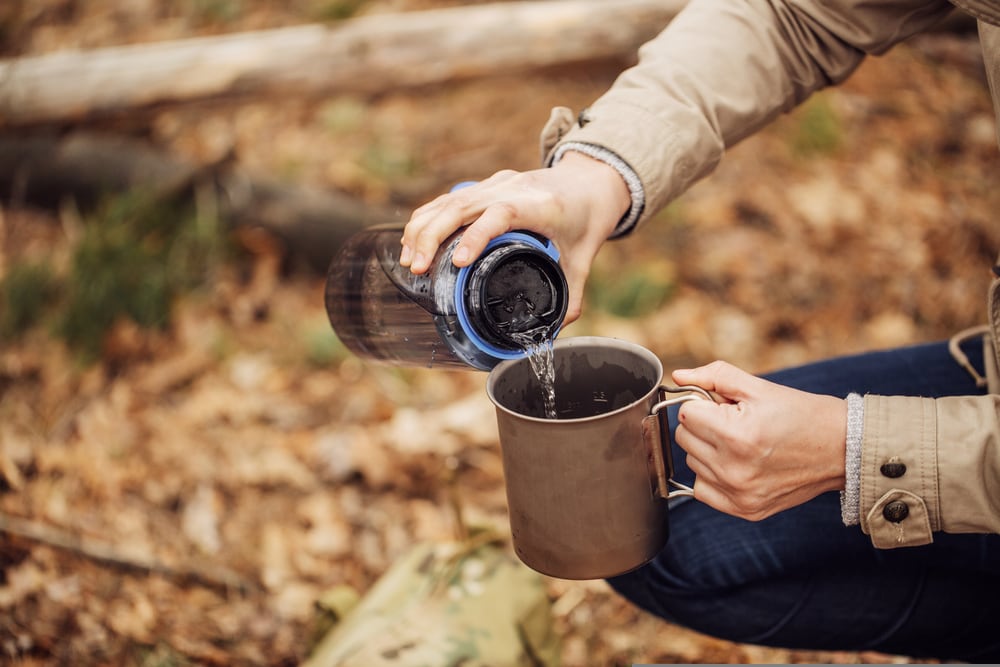
Since you won’t have access to fresh water to fill up your water tanks, you’ll have to be a bit more careful about how much water you use.
A good starting point is to determine your tank’s capacity. You have to consider the activities planned out and how much water each will consume when your camping so that you don’t waste any or run out
It’s a smart idea to start saving more water before you go on your dry camping trip. This time should be used to fill up your fresh water tanks and empty sewage so that you don’t have to worry about that right away when you arrive at your dry camping location.
Generate Power For Your RV
Many motorhomes have in-built gasoline-powered generators which will help you to recharge devices as well as batteries.
If you don’t have a generator in your RV, you can buy one and then connect it to your batteries, but remember to be considerate to other campers when using a generator as these are sometimes frowned upon in or not among the campground rules.
- Quiet and Friendly 240 watt-hour generator
- Features 1 AC outlet, 2 USB A-ports and 1 DC car port
- Large capacity with small size
Consider Your RV’s Size
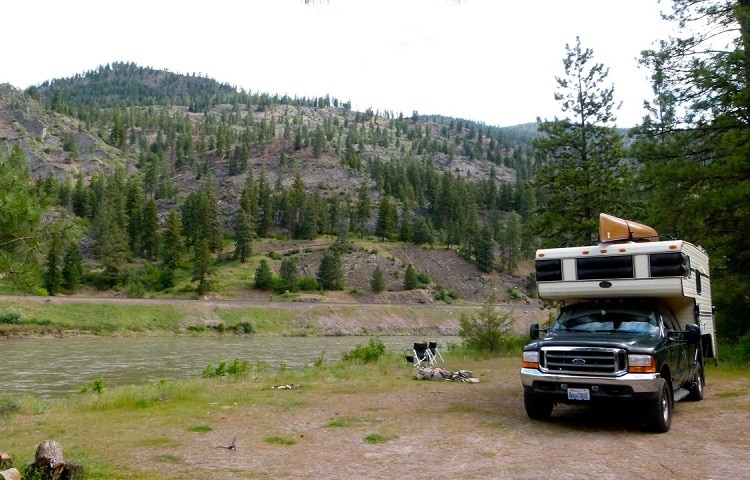
Your RV’s size could work in your favor when dry camping, or it could be a disadvantage.
For example, if you’ve got a small truck camper, its small size could enable you to camp anywhere – but it will have reduced space for your resources, so you won’t have as much capacity as you’d like when it comes to things like grey and black water storage.
The opposite holds true for larger RVs: you might have lots of capacity but not be able to park in as many places. You should consider what your comfort level and needs are before you choose to dry camp with your RV or rent an RV.
Get The Right RV Features
Make sure your RV has enough resources for what you need during your trip. These include a generator, solar panel hookups, enough black, grey, and freshwater tank capacity for yourself and your family, a roof vent fan to keep the air nice and remove unpleasant odors, and LED lights to make you less dependent on electricity.
- Portable and foldable solar charger
- With built-in A & C port
- 23% high conversion efficiency
Choose The Right Location
You should be wary of the season in which you’re dry camping so that you keep your RV functioning properly and ensure a more comfortable time in it. For example, when it’s cold, you should put your RV in a sunny spot so that you save your use of propane.
On the other hand, if the weather’s hot, park your RV in the shade so that it remains cool inside and doesn’t result in you using your air conditioner that will drain your RV’s battery.
Stay safe!
You’ll be dry camping in a remote location so you want to ensure that you’ve stocked up on safety items and that you follow some important precautions.
Here are some of the most important ones:
- Let someone know your camping coordinates in case you can’t reach them in the event of an emergency.
- Keep your phone charged. You can find out how to do so when you’re outdoors by reading, “How To Charge Your Phone While Camping.”
- Carry a first-aid kit with first-aid supplies, a flashlight, extra fuel, an all-weather radio, emergency food and water, and blankets.
- Make sure you’ve got a fire extinguisher in your RV.
- Don’t forget to bring your RV’s manual as you never know if you might need it when you’re on the road.
Here’s a YouTube video of dry camping essentials you should always have.
Where Can You Dry Camp?
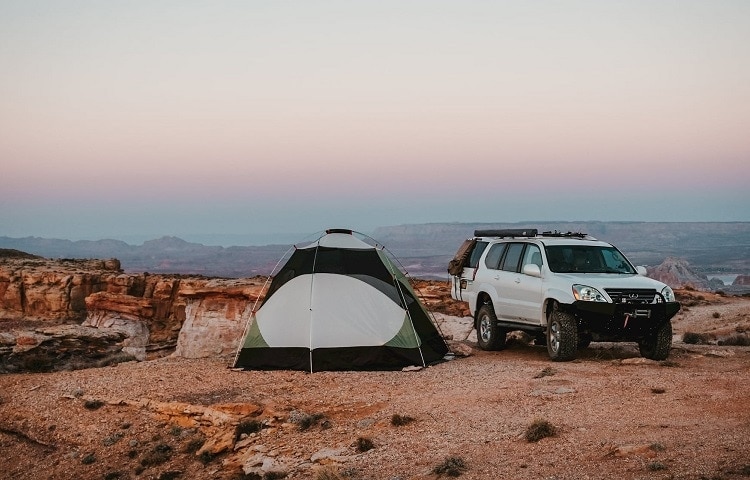
There are many ways in which you can dry camp. Here’s a rundown of some of the most popular dry camp locations.
- You can dry camp with your RV in the backcountry, thanks to how many national parks and forests have primitive campgrounds that are equipped for RV sites. These are ideal for small RVs and pop-up campers. But just make sure you check with them ahead of time in case you require a permit.
- You can dry camp in national forests and Bureau of Land Management (BLM) lands all over the U.S. These typically have primitive campgrounds without any hookups or amenities.
- You can also dry camp in a privately-owned campground that doesn’t have any hookups available, so you will depend on your resources, such as generators and tanks.
For How Long Can You Dry Camp?
If you’re used to dry camping, you could find that you can go up to 14 days without having to refill your water supply or dump your tanks.
That’s pretty amazing, but are you allowed to dry camp in a location for this amount of time?
On most national forest lands, you’re allowed to stay for a maximum of 14 days. This period of time usually applies to all dry camping spots, but you should always check to find out.
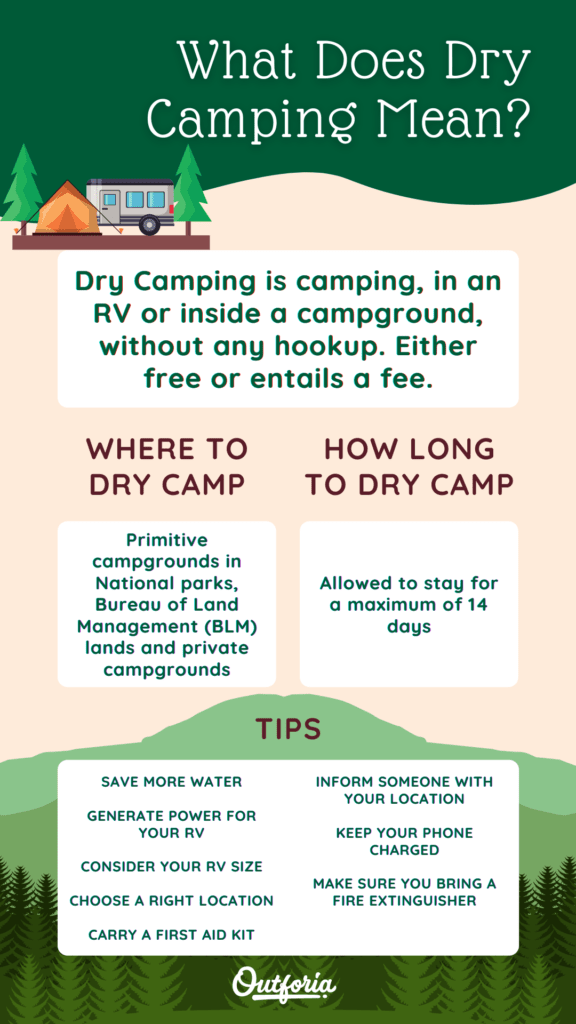
Share This Image On Your Site
<a href="https://outforia.com/what-does-dry-camping-mean/"><img style="width:100%;" src="https://outforia.com/wp-content/uploads/2021/01/GI-How-to-Charge-your-phone-1-1-576x1024.png"></a><br> Dry Camping Infographic by <a href="https://outforia.com">Outforia</a>Is Dry Camping Legal?
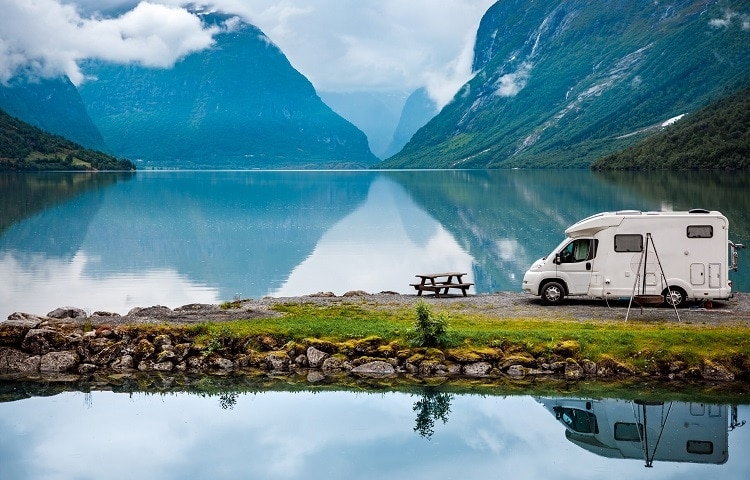
One of the biggest questions you might have about dry camping is if it’s legal. The thought of staying in an overnight spot with your RV or camping out in pristine campgrounds might make you worry, especially if no one knows that you’re there.
While you can camp in private places, you will always need to get the permission of the owner, otherwise that could get you into trouble.
When it comes to setting up your camp in a public space, you’ll have to check the rules to find out if you’re allowed to do so and if there are any restrictions.
For example, it’s a good idea to find out if you have permission to dry camp in a National or State park before you pack up your RV and head to the location. You’ll also have to ensure you stay within the designated dispersed camping location.
Related Questions
What does “dispersed camping” mean?
This refers to when you camp beyond a developed campground, so you won’t have facilities or amenities, from trash removal to picnic tables and even fire pits.
Some national forest and state parks will require dry campers to stay within dispersed camping areas during their stay.
What is wild camping?
This is a term that’s used to describe the activity of camping in a tent, car, or RV in any public area that’s not regarded as a designated campground.
Conclusion
If you’ve ever asked the question “What does dry camping mean?” now you have your answer!
Dry camping is a fantastic way to rough it in the outdoors, so if you wish to sidestep the RV resorts in favor of getting right into nature, you’ll want to try it out – but be warned, it can be tricky.
This is why it’s important to plan ahead and prep, especially if you have no experience with dry camping.



